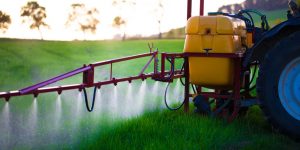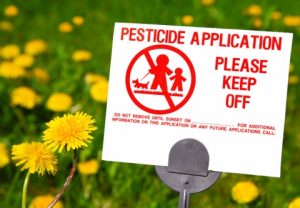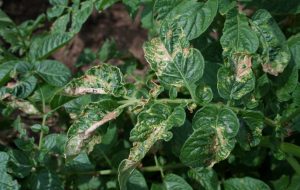Pesticides
- What Are Pesticides?
- What Are Ohio's Pesticide Regulations?
- General Pesticide Application
- Pesticide Storage
- Pesticides & The Environment
- Have More Questions about Pesticides?
What Are Pesticides?

Pesticides are more commonly used than some people would think. When people use ant or cockroach spray for their houses, weed killers for their lawns, mildew cleaner for bathrooms, and even bug-spray, they are using pesticides. But what exactly are pesticides? Pesticides are any substance or mixture of substances that are used for preventing, repelling, destroying, or mitigating any pest. Pesticides can be broken up into different categories based on their purpose. These include but are not limited to; herbicides (plant regulator), insecticides (insect regulator), rodenticides (rodent regulator), fungicides (fugus regulator), disinfectants, and insect repellents. For more in-depth information about pesticides, you can visit the Ohio Department of Agriculture’s website about the pesticide program.
What Are Ohio's Pesticide Regulations?
There are two different types of pesticides product classifications. There are restricted use pesticides (RUPs) and general use (unclassified) pesticides. RUPs are not available for general public purchase or use. RUPs have the potential to cause detrimental effects to the environment and injury to applicators and bystanders if used incorrectly. Therefore, only licensed Private or Commercial Pesticide Applicators can purchase and use these pesticides. To obtain a Private Pesticide Applicator license or Commercial Pesticide Applicator license, register for the pesticide licensing exam, or renew your license, you can visit the Ohio Department of Agriculture website for proper forms. General use pesticides are available for purchase and use by the public. These products are not as dangerous as RUPs, but still can cause harm if used improperly or in excess. It is illegal to use pesticides for anything other than their intended use specified on the label.
General Pesticide Application

Homeowner pesticide application can be dangerous if not done correctly. If you purchase general use pesticides and intend to use them, make sure to always follow these tips:
- ALWAYS read the instructions and warning label on the container
- Make sure to use appropriate safety gear like safety glasses, gloves, proper clothing, etc.
- Keep people and animals out of the treatment area for the recommended period of time indicated on the product label
- Never smoke, eat, or drink while applying pesticides
- Do not apply pesticide if it is windy or there is a predicted rain event in the near future
- Make sure there is proper ventilation where pesticides are being applied
Pesticide Storage
To ensure a safe environment for all, make sure pesticides are stored properly. Always keep pesticides in their original containers so that you always can identify the contents and read the labels. Make sure that all lids are fastened tightly and keep out of reach of children. If a spill does occur in storage, rather than washing away the pesticide, sprinkle something over the spill to absorb it. Saw dust, kitty litter, or vermiculite are great options when absorbing spills. Sweep absorbed product into garbage bag and dispose of it according to the product label.
Pesticides & The Environment

If not used or stored properly, pesticides can have harmful effects to our surrounding environment. Pesticides can harm wildlife, vegetation, air quality, soil quality, and water quality.
- Wildlife:There are many ways that wildlife can encounter pesticides, they can drink contaminated water, touch treated areas, and consume treated vegetation. Young animals in hiding or in hidden nests may also be exposed directly during the application process. Pesticides can also destroy food and habitat wildlife may rely on.
- Vegetation: Whether it’s in your garden or around your house, plants that come in contact with pesticides often absorb them. To avoid adverse effects to vegetation, make sure to use pesticides that are specifically for the pest you are trying to control. Failure to do this may result in the death of vegetation or contamination, most likely due to herbicides.
- Air Quality: Pesticides can contaminate our air and cause harm to plant and human health. The amount of harm a pesticide can do when dispatched into the air depends on the amount that is released, how toxic the pesticide is, and how much humans or vegetation get exposed to. Also, different chemicals stay in the atmosphere longer than others.
- Soil Quality: When applied to the soil, pesticides will break down, but some take longer than others to do this. This depends on the type of soil they are applied to and the type of pesticide one uses. Overuse and misuse of pesticides can lead to contamination of soil, which can harm soil organisms and plants. This can make the area toxic and hard to grow vegetation and sustain life into the future.
- Water Quality: Pesticides that enter waterways have the potential to travel long distances through the hydrologic cycle and cause harm. Fog, humidity, and rain can increase the chances of pesticide runoff into storm drains or waterways. Sensitive species of fish, birds, and amphibians can be harmed if pesticides run off into waterways. Pesticides that enter water through runoff can also become toxic to animals and humans if it contaminates any source of drinking water.
For more information about pesticide products and their affects to the environment, visit the National Pesticide Information Center.
Have More Questions about Pesticides?
If you have more questions or concerns about pesticides and their effects on pollinators, you can visit these sites for more resources and information:
- Ohio State Beekeepers Association – Pesticides and Honeybees
- Ohio EPA – Protecting Bees and Other Pollinators from Pesticides
- OSU – Protecting Pollinators While Using Pesticides
- OSU – Pesticides and Bees
If you or beekeepers in the area need to report apparent pesticide kills, contact the Ohio EPA or Ohio Department of Agriculture.